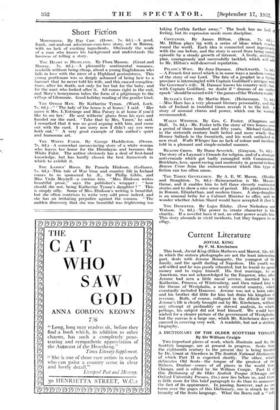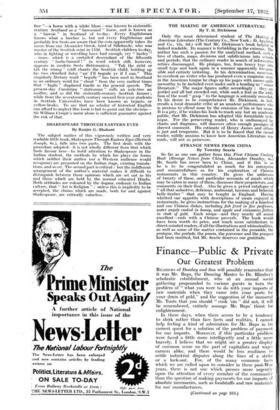A DICTIONARY OF THE OLDER SCOTTISH TONGUE By Sir William
Craigie Two important pieces of work, which illustrate and fix the Scottish language, are at present in progress. Scots from the eighteenth century to the present day is being treated by Dr. Grant at Aberdeen. in The Scottish National Dictionary, of which 'Part II is expected shortly. The other, which delineates Old Scots—the tongue of the greatest of the Makers, Dunbar—comes of all places in the world from Chicago, and is edited by Sir William Craigie. Part II of this Dictionary of the Older Scottish Tongue (Chicago and Oxford University Presses, 21s.) now lies before us, and there is little more for this brief paragraph to do than to announce the fact of its appearance. In passing, however, and as one turns over the pages of this Dictionary, one is struck by the tenacity of the Scots language. What the Boers call a " toll. free "—a horse with a 'White hlaze-2-vias- known to sixteenth- centuryScotland as a " bawsound " horse, and is known as bawsie " in Scotland of to-day. Every Englishman knows what a bawbee is, but not every Englishman and probably few Scots are aware that the coin apparently takes its name from one Alexander Orrok, laird of Sillebazabe, who was master of the Scottish mint in 1538. Scottish children to-day, who in fighting or wrestling have had enough, cry " barley ' —truce—which is a curtailed descendant of the fifteenth century " barla-fummil ! " (a word which still, however, appears in modern Scots dictionaries). " Tak the richt or tak the wrang " (still chants the Scottish child, holding up his two clenched fists) "an' I'll beguile ye if I can." This singularly literary word " beguile " has been used in Scotland as an ordinary word for " cheat from the very earliest times that " Inglis displaced Gaelic as the general speech. The present-day Cumbrian " statesman " calls an axle-tree an assiltre, and so did the sixteenth-century Scottish farmer ; while from the seventeenth century onward first-year students in Scottish Universities have been known as bejants or yellow-beaks. To say that no scholar of historical English can afford to neglect this book is but to point out the obvious— Sir William Craigie's name alone is sufficient guarantee against the risk of that.































 Previous page
Previous page